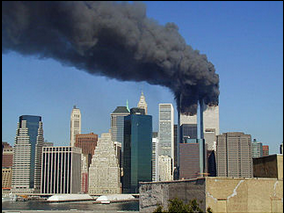
by Cheryl Lacey, ©2021
(Sep. 11, 2021) — [Editor’s Note: The following is excerpted from “The Ultimate Parent Teacher Interview: A Guide for Australian Teachers by the author.]
Just four days earlier, my five-year-old daughter and I had moved from Melbourne to New York.
Introduction
I was living my dream – doing the two things I loved best: being a mum and inspiring school leaders to raise the bar of the teaching profession.
On the morning of September 11, I had commenced work – consulting with teachers in a large Brooklyn public school. As I walked past the office, I heard an administrator yell: “Oh my God, a plane has hit the Pentagon”.
Within minutes I was thrust into taking a lead, with the principal, operating with calm and order, but with no details other than the school was in lockdown.
I thought immediately of my own daughter, in school, several suburbs away. I had no way of reaching her. Was a leader watching over her, just as I was helping to care for 900 children and dozens of staff? Did she know that I was desperate to be with her? Was she as scared as I was?
The day was a surreal blur. As the morning’s events continued to unfold, we responded to
departmental instructions, consoled staff who had family and friends working in downtown
Manhattan, and co-ordinated security pick-ups for panicked parents desperate to have their
children close. Amidst all the activity, we maintained a positive and professional front –
encouraging teachers to continue as best they could, and distracting the children until we
knew more.
I finally reached my daughter at 5pm. She was the last remaining child at the school. Both
shocked and elated to see me, she said, “I thought you were gone and I would have to find a
new mummy”. It rocked my identity to the core.
What had I done that day? Why hadn’t I run to my daughter?
Was I wrong to feel angry that in helping reconnect mothers with their children, I was
disconnected from mine? Was I wrong to care that the principal valued my ability to help lead in such a difficult situation? Was I wrong to stay put, and remain the consummate
professional? Wasn’t I a mother? Wasn’t I a teacher? Could I be both? What was I?
No-one wanted to stay at school that day but some had to. Everyone wanted to be with loved
ones – but some couldn’t.
That tragic day wasn’t a working day for me; it was a day of profound despair. It was the day
when my two selves – mother and teacher – collided. Fear gave way to focus. Reasoning
tempered my desire to flee. Adrenalin and a deep knowing fuelled my actions.
13 September 2001
Two days later, the harsh reality of my new life had begun. I returned to working in schools
with metal detectors, wire fences, and barred windows. We were living with high alert
security, while at the same time maintaining the heartbeat of the community – its school. I
attended funerals for the victims, and scanned ‘missing person’ posters, but also skipped
down the street with my daughter, as though the world were one big rainbow.
The events of those days represented a turning point for me. In schools, I was embraced as a
professional, yet denied ready access as a parent. As a consultant at my daughter’s school,
the security staff would greet me with a smile as I arrived each day. I would happily hand over my identification, and be signed in, before walking up the steps to the office and beyond. By contrast, when I attended in my capacity as parent, there’d be no smile or greeting, but a series of questions, and a demand for evidence of my right to be there. My curiosity turned to sadness. Parents rarely entered school buildings and usually remained outside the school gate. It became increasingly clear that my profession gave me privileges they were denied. The great divide between home and school, and the sheer hypocrisy of all that schools claimed to stand for, were clear.
Witnessing New York’s psychological recovery from the 9/11 attacks, and working in a school system that was new to me, helped me identify the path I wanted to take. Since becoming a teacher, more than a decade before, I had wanted passionately to nurture the genuine parent-teacher relationship, but I knew that, first, I had a lot of learning and healing to do.
Now, more than a decade later, I realise that September 11 was the beginning of my agitation for effecting change on a global level, and my motivation was intensified by what I call ‘mother guilt’. How could I accept that to be the best parent for my child, I might sometimes have to be a better professional to achieve it?
Today, I can finally accept that on that fateful day I did not fail my daughter. I also know that my daughter’s teacher did not fail me. We both did what we could for mother and child. We honoured our professional accountability to protect and assist the children in our charge. And the line was drawn there. We did not become mother for child.
Cheryl Lacey is also the author of “Marching Schools Forward: Discussions on the Direction of Australian Education.”

Great song and video: https://cdrkerchner.wordpress.com/2021/09/11/its-time-to-take-a-stand-remember-who-you-are-by-krista-branch/